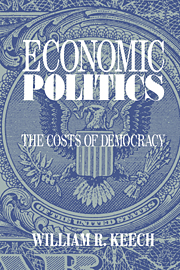Book contents
- Frontmatter
- Contents
- List of figures and tables
- Preface and acknowledgments
- INTRODUCTION
- MODELS OF ROUTINE POLITICS
- THE SOURCES AND AUTHORITY OF MACROECONOMIC GOALS
- 5 The Authority of Macroeconomic Goals
- 6 Voters, Elections, Accountability, and Choice
- INSTITUTIONS AND PROCESSES
- CONCLUSION
- References
- Index
6 - Voters, Elections, Accountability, and Choice
Published online by Cambridge University Press: 05 June 2012
- Frontmatter
- Contents
- List of figures and tables
- Preface and acknowledgments
- INTRODUCTION
- MODELS OF ROUTINE POLITICS
- THE SOURCES AND AUTHORITY OF MACROECONOMIC GOALS
- 5 The Authority of Macroeconomic Goals
- 6 Voters, Elections, Accountability, and Choice
- INSTITUTIONS AND PROCESSES
- CONCLUSION
- References
- Index
Summary
Voters are the ultimate authority in a democracy. Their preferences and behaviors are the fundamental sources of legitimacy for policymakers, who get their power through elections. Their preferences and behaviors also place constraints on what elected politicians can do. The electorate is the source for the authority of constitutional rules of procedure and for the authority of official statements of public goals. When there is ambiguity about what goals are appropriate for public policy, voter choices can resolve them at least provisionally. When there is ambiguity about which potential officeholders have correct or appropriate beliefs about the way the economic world works, voter choices can determine which ones will get to test their views against experience.
All this would be true in a world of ideal democratic citizens, but it is true in the real world as well. Yet the effort to maximize one's share of the votes of even ideal citizens can lead to opportunism, according to some of the models of political economy we have reviewed. And whereas ideal citizens may be public-spirited and fully informed, real-world voters may not have either of those qualities. This chapter will assess what we know about how voting behavior is affected by macroeconomic issues, as well as the implications for policy making.
Most real-world voters are not well informed about political issues; they sometimes are characterized as being vulnerable to cynical manipulation by opportunistic politicians.
- Type
- Chapter
- Information
- Economic PoliticsThe Costs of Democracy, pp. 127 - 150Publisher: Cambridge University PressPrint publication year: 1995

